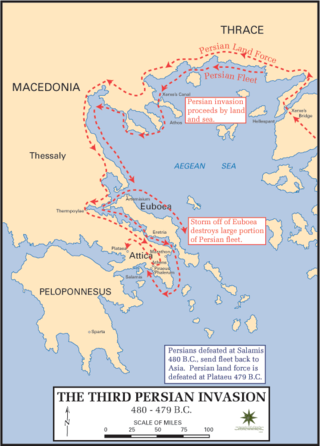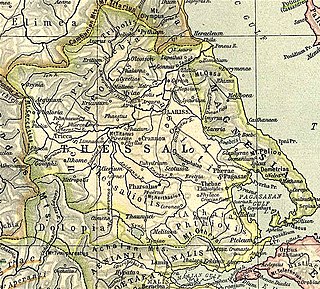Alexander was Tyrant or Despot of Pherae in Thessaly, ruling from 369 to c. 356 BC. Following the assassination of Jason, the tyrant of Pherae and Tagus of Thessaly, in 370 BC, his brother Polyphron ruled for a year, but he was then poisoned by Alexander who assumed power himself. Alexander governed tyrannically and was constantly seeking to control Thessaly and the kingdom of Macedonia. He also engaged in piratical raids on Attica. Alexander was murdered by Tisiphonus, Lycophron and Peitholaus, the brothers of his wife, Thebe, as it was said that she lived in fear of her husband and hated Alexander's cruel and brutal character.
Year 481 BC was a year of the pre-Julian Roman calendar. At the time, it was known as the Year of the Consulship of Vibulanus and Fusus. The denomination 481 BC for this year has been used since the early medieval period, when the Anno Domini calendar era became the prevalent method in Europe for naming years.

Year 479 BC was a year of the pre-Julian Roman calendar. At the time, it was known as the Year of the Consulship of Vibulanus and Rutilus. The denomination 479 BC for this year has been used since the early medieval period, when the Anno Domini calendar era became the prevalent method in Europe for naming years.
This article concerns the period 479 BC – 470 BC.
This article concerns the period 469 BC – 460 BC.

Year 480 BC was a year of the pre-Julian Roman calendar. At the time, it was known as the Year of the Consulship of Vibulanus and Cincinnatus. The denomination 480 BC for this year has been used since the early medieval period, when the Anno Domini calendar era became the prevalent method in Europe for naming years.
This article concerns the period 379 BC – 370 BC.
This article concerns the period 389 BC – 380 BC.
This article concerns the period 369 BC – 360 BC
This article concerns the period 359 BC – 350 BC.
This article concerns the period 339 BC – 330 BC.
Year 385 BC was a year of the pre-Julian Roman calendar. At the time, it was known as the Year of the Tribunate of Capitolinus, Cornelius, Capitolinus, Papirius, Capitolinus and Fidenas. The denomination 385 BC for this year has been used since the early medieval period, when the Anno Domini calendar era became the prevalent method in Europe for naming years.
Year 358 BC was a year of the pre-Julian Roman calendar. At the time, it was known as the Year of the Consulship of Ambustus and Proculus. The denomination 358 BC for this year has been used since the early medieval period, when the Anno Domini calendar era became the prevalent method in Europe for naming years.

Year 371 BC was a year of the pre-Julian Roman calendar. At the time, it was known as the Fifth year without Tribunate or Consulship. The denomination 371 BC for this year has been used since the early medieval period, when the Anno Domini calendar era became the prevalent method in Europe for naming years.
Year 369 BC was a year of the pre-Julian Roman calendar. At the time, it was known as the Year of the Tribunate of Fidenas, Cicurinus, Cossus, Cornelius, Cincinnatus and Ambustus. The denomination 369 BC for this year has been used since the early medieval period, when the Anno Domini calendar era became the prevalent method in Europe for naming years.
Year 368 BC was a year of the pre-Julian Roman calendar. At the time, it was known as the Year of the Tribunate of Cornelius, Praetextatus, Structus, Capitolinus, Crassus and Cicurinus. The denomination 368 BC for this year has been used since the early medieval period, when the Anno Domini calendar era became the prevalent method in Europe for naming years.
Year 364 BC was a year of the pre-Julian Roman calendar. At the time, it was known as the Year of the Consulship of Peticus and Calvus. The denomination 364 BC for this year has been used since the early medieval period, when the Anno Domini calendar era became the prevalent method in Europe for naming years.

Pelopidas was an important Theban statesman and general in Greece, instrumental in establishing the mid-fourth century Theban hegemony.

Pherae was a city and polis (city-state) in southeastern Ancient Thessaly. One of the oldest Thessalian cities, it was located in the southeast corner of Pelasgiotis. According to Strabo, it was near Lake Boebeïs 90 stadia from Pagasae, its harbor on the Gulf of Pagasae. The site is in the modern community of Velestino.
The Thessalian League was a koinon or loose confederacy of feudal-like poleis and tribes in ancient Thessaly, located in the Thessalian plain in Greece. The seat of the Thessalian League was Larissa.



